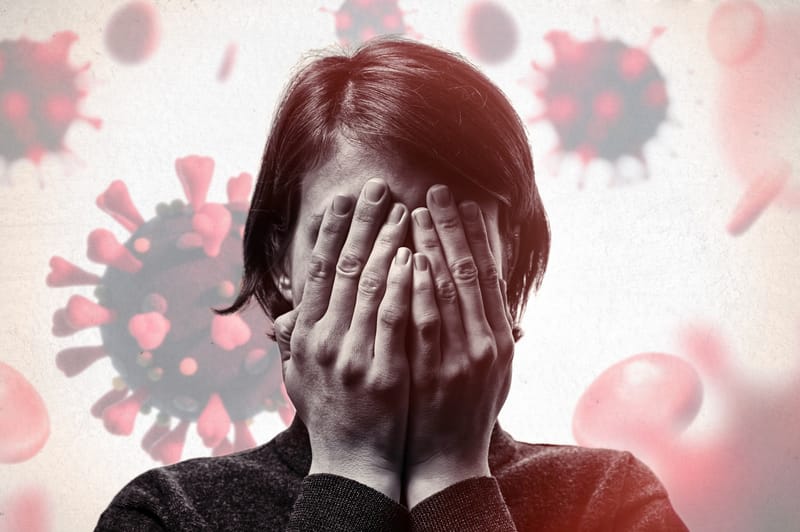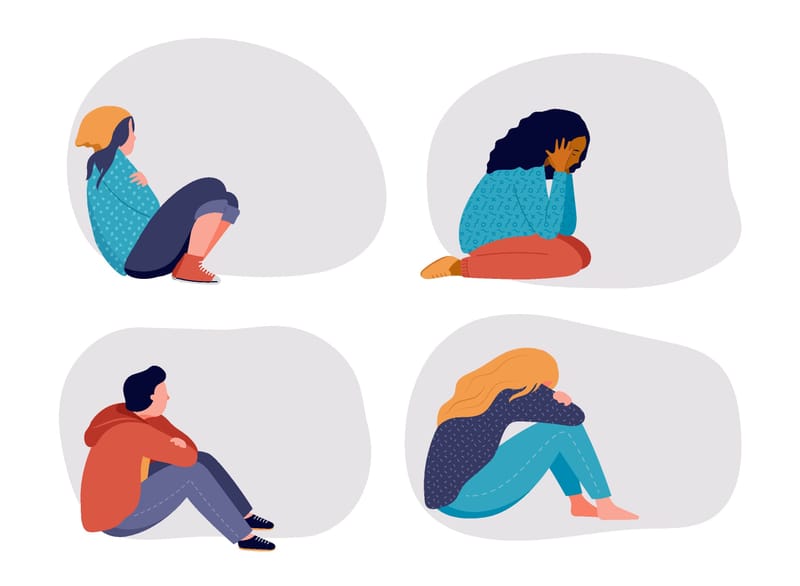
COVID-19 has paradoxically made sexual and gender-based violence in the home both more prevalent and more invisible to protection services. At the same time, it's more visible via awareness-raising such as the UN Secretary-General’s declaration in April 2020 that a “shadow pandemic” of domestic and gender-based violence was occurring globally as a result of pandemic restrictions.
But what has been the impact of COVID-19 on reporting conflict-related sexual and gender-based violence in situations of fragility, seemingly in the shadow of the "shadow pandemic"?
In 2020, the challenges to humanitarian and development work have been immense. Ethical research and data collection conduct has prevented direct documentation and access to many victims and survivors of sexual and gender-based violence.
Research is important to be able to understand the impacts of health emergencies, including COVID-19, on violence and conflict. Yet our methods need to ensure the safety of survivors and victims, as well as first responders.
Well before COVID-19 (since 2014), in order to address access to reporting institutions and to develop a less intrusive way of documenting sexual and gender-based crimes in conflict areas, we began collecting news and open-access non-governmental organisation reports on their incidence in "low-intensity" conflict zones.
Read more: Coronavirus crisis compounds efforts to reach and protect vulnerable women and children
Our data collection was first in Myanmar, Philippines and Sri Lanka, then later extended to Colombia, where in all cases fighting, violence and displacement have been dangerously high. In these countries, it wasn't safe to travel to some areas and ask individuals about their experience of sexual violence, for instance.
Yet we wanted to know whether open-access reports can be used to understand the patterns of sexual and gender-based violence, and their relationship to the onset and intensity of conflict. We wanted to see how this knowledge could inform prevention strategies, and whether new technologies might offer methods of reporting sexual and gender-based violence.
These questions are even more relevant during the COVID-19 pandemic.
COVID compounds violence, and the challenges of reporting it
Data collection on sexual and gender-based violence was always dangerous and difficult in fragile settings prior to COVID-19. The current concerns that we cannot identify victims or understand patterns of violence were also already contentious issues.
However, in highly securitised situations, the response to COVID-19 has made it even more difficult to gain access to some communities.
Read more: A bubble set to burst: Why urgent support must be given to domestic violence workers
In Colombia and Myanmar, countries undergoing immense political reform and transition, where there's an endemic pattern of sexual and gender-based crimes, surges of COVID-19 infections compounds the challenges that existed pre-pandemic. At the same time, the decrease in humanitarian workers and aid on the ground, increased economic vulnerability, and limited dissemination of information have all increased the risk of exploitation and sexual abuse.
According to reports in conflict situations, COVID-19 has increased the prevalence of sexual and gender-based violence while severely constraining reporting of this violence, and response to it.
For example, in Colombia “illegal armed groups and criminal organisations are taking advantage of the pandemic to expand their territorial control, increasing the suffering of communities and individuals”. This control includes drug trafficking routes.
In the lower Cauca and northeast Antioquia regions, health pandemic emergency restrictions on mobility, including roadblocks and checkpoints, have empowered illegal groups to target those breaching restrictions or infected with COVID-19 for killing “to avoid contaminating the rest of the population.”
Read more: Listening to adolescent girls in times of ongoing crisis
As a result of COVID-19 quarantine and lockdowns in conflict settings, many victims of sexual and gender-based violence cannot access services, nor can they report the violence they experience in already difficult situations to the few institutions available.
There's a real risk, therefore, that as communities seek security and protection from the pandemic, there's less protection from sexual and gender-based violence, and less access to minimum initial service packages (MISP) in conflict and fragile areas.
Responding to the ‘shadow pandemic’
Despite the obstacles mentioned above, the same governments and civil society organisations have been responding to this "shadow pandemic" with new and strengthened approaches – raising awareness of sexual and gender-based violence, enhancing safety mechanisms, and better coordination among agencies and their referral pathways.
Possibly, though, it's too early to tell, because the COVID-19 pandemic is universal, and all countries appear to be experiencing rises in gender-based violence. There's less stigma and more pressure for all governments to respond, including those that have shown impunity for this type of violence in the past.
In Myanmar, for example, with donor support, the Department of Social Welfare through community-based organisations has provided paralegal training, legal aid services, safe spaces and shelter homes with a special focus on COVID-19 response.
Sixty free helpline numbers in seven states and seven regions providing psychosocial support for survivors of “Violence Against Women, in time of COVID-19”, temporary shelter, and COVID educational materials on the impact of COVID in the national, as well as a range of ethnic, languages indicate responsiveness.
It's critical that more is done to legitimise, recognise and fund the role of civil society groups as first responders to victims of sexual and gender-based violence.
Similarly, in Colombia, the government has provided multiple helplines at the national level, and local levels in some regions, as well as virtual messaging to support GBV survivors through email and WhatsApp.
In Bogota, Colombia’s capital, the program involves more than 600 supermarkets and pharmacies from three different chains, and store managers are being trained in how to respond to women seeking help, and how to contact the police.
The Presidential Council for Women supported the conversion of 65 buildings in 15 subregions into shelters for women at high risk of violence during lockdowns. But to date they've been unable to adapt a single building in Bogota. Under the Equipares seal program, the Colombia government’s Department of Labour has prioritised job vacancies for women victims of gender-based violence.
However, these initiatives in Colombia and Myanmar don't address or minimise the existing challenges in the conflict-affected and fragile areas of the countries, and therefore they can't benefit from the expanded services during COVID-19. The ongoing conflict, security threats, and already limited infrastructures and service delivery points in those areas remain unsolved.
Learning from COVID, localising GBV responses
As well as government responses during COVID-19, local women-led civil society organisations have been vital in responding to sexual and gender-based violence. The pandemic has revealed the importance of informal reporting channels in the context of heightened risks in documenting sexual and gender-based violence, in accessing services, and the usual protection pathways.
There's been a heavy reliance on civil society to receive and share this data. Survey research in the Indo-Pacific region mapping the impacts of COVID-19 on women, peace and security has revealed that when access to government and international services has been disrupted or closed, civil society organisations adapt and innovate to reach vulnerable populations. Without their position in location, we'd be struggling to know about the impact of COVID-19 on women’s insecurity in 2020.
It's critical that more is done to legitimise, recognise and fund the role of civil society groups as first responders to victims of sexual and gender-based violence, as called for in UN Security Council Resolution 2242 (Women, Peace and Security) and UN Security Council Resolution 2352 (COVID-19).
Our research has found that civil society practitioner observations are a valuable source of information and data in place of official reports by victims/survivors during crises. Practitioner expertise on the patterns of sexual violence is needed so that data and evidence continue to inform prevention and understanding of the local risks in situations that are both dangerous, and difficult to access, whether due to conflict or COVID-19 or both.
Many new approaches to responding to gender-based violence in the home have been introduced or tailored to address COVID-19 impacts around the world, including in conflict-affected countries.
Ideally, increased responsiveness to domestic violence in light of poor access to protection should extend to the most vulnerable settings. Moreover, approaches and technologies shown to be effective during COVID-19 may be able to scale up in the post-COVID-normal environment as part of routine responses to conflict-related sexual and gender-based violence.
We need to empower local actors, and optimise their conditions for reporting violence. Sexual violence response is a health, social and justice issue.
COVID-19 has revealed the difficulties of preventing and responding to sexual violence in conflict situations. It's also revealed the power that states and donors have to address and end this violence.





